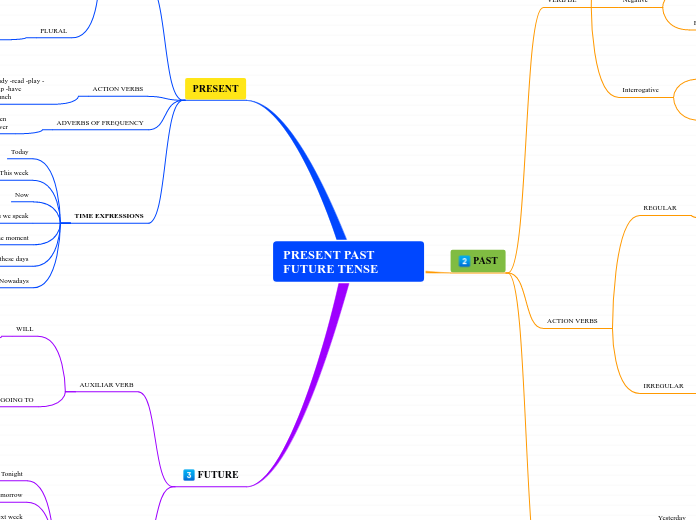PRESENT PAST FUTURE TENSE
PAST
VERB BE
Affirmative
Singular
Was
I
He
She
It
Plural
Were
We
You
They
Negative
Singular
Was Not- Wasn't
I
He
She
It
Plural
Were Not- Weren't
We
You
They
Interrogative
Singular
Was I?
Was He?
Was She?
Was It?
Plural
Were We?
Were You?
Were They?
ACTION VERBS
REGULAR
rules of verb endings
Ed
-Played -Washed -Offered -Jumped -Enjoyed -Talked
D
Danced -Liked -Loved -Lived
ied
-Studied -Cried -Copied -Tried
double consonant
Stopped - Chopped -Planned
IRREGULAR
Verbs that only change one letter to form their past tense
Came
Made
Verbs that have the same past as the present, that is, they are written in the same way, their structure does not change.
Cut
Read
Verbs that completely change their structure in the past.
Went
Ate
Did
Bought
Felt
TIME EXPRESSIONS
Yesterday
Last week
An hour ago
Recently
A long time ago
In the past
This morning
PRESENT
VERB BE
SINGULAR
AM
I
IS
HE
SHE
IT
PLURAL
ARE
YOU
WE
THEY
ACTION VERBS
-Brush -sleep -study -read -play -go to home -get up -have breakfast -have lunch
ADVERBS OF FREQUENCY
-Always -Usually -Frequently -Often -Sometimes -Seldom -Not often -Never
TIME EXPRESSIONS
Today
This week
Now
As we speak
at the moment
these days
Nowadays
FUTURE
AUXILIAR VERB
WILL
The will in English is commonly recognized as the auxiliary used to form future tenses
BE GOING TO
VERB BE
Affirmative
Subject + Auxiliary + Goint to + Verb (Infinitive) + Complement
Negative
Subject + Negative auxiliary + Going to + Verb + Complement
Interrogative
Auxiliary + Subject + Goint to
+ Verb(Infinitive) + Complement + ?
TIME EXPRESSIONS
Tonight
Tomorrow
Next week
Soon
In the near future
Eventually
Later this evening
Next month
